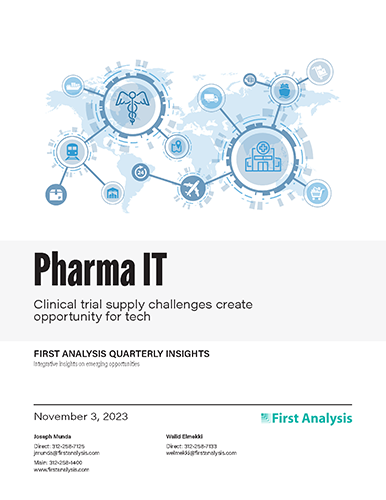Quarterly insights: Pharma IT
Clinical trial supply challenges create opportunity for tech

Clinical trial supply chains are deeply interconnected. However, teams throughout the process often work in silos, making clinical trial supply management extremely complex and difficult.
Given the pivotal role of supply chains in patient safety, clinical trial efficiency and overall trial success, pharmaceutical companies are increasingly focused on improving supply chain management, most notably by making greater use of supply chain software.
We examine four areas where clinical trial supply chain management software is having a high-profile impact: randomization and trial supply management and forecasting, sample management, condition monitoring, and cell and gene therapy. We also profile some of the technology solutions innovative companies offer in each of these areas.
TABLE OF CONTENTS
Includes discussion of six private companies
- Pandemic experiences highlighted the need to address trial supply challenges
- Multiple pain points in supplying clinical trials
- Randomization and trial supply management and forecasting
- Sample management
- Condition monitoring
- Cell and gene therapy
- Advanced technology meeting the needs of advanced therapeutics
- Commercialization index in line with markets; eClinical far behind
- Pharma IT M&A: Notable transactions include CorEvitas and Clario
- Pharma IT private placements: Notable transactions include Clinetic, QuantHealth
Pandemic experiences highlighted the need to address trial supply challenges
Clinical trials are the backbone of medical research, serving as a key bridge between drug development and patient care. As we have discussed in our previous reports, clinical trials are expensive and time consuming, and any delay pushes out the timeline for potential approval, meaning lost opportunities to improve patients’ lives and unrecoverable revenue. Supplying clinical trials with trial therapies, or investigational medicinal products (IMPs), is a pivotal part of the clinical trial process that can affect trials’ success, cost and speed. The critical nature of clinical trial supply management became especially apparent during the pandemic, which highlighted supply chain weaknesses in areas such as third-party logistics, forecasting, inventory visibility and staffing. With this in mind, pharmaceutical companies are increasingly turning to technology-based solution providers to handle some or all of their clinical trial supply needs.
Multiple pain points in supplying clinical trials
Clinical trial supplies are the investigational medicinal products and other materials and equipment needed to effectively conduct clinical trials. This includes everything from drugs being tested to patient biological samples to the packaging and labeling used in moving them from one location to another. Managing clinical trial supplies involves a range of activities, from planning and forecasting to procurement and distribution. Clinical trial supply chains are deeply interconnected. Expected enrollment levels at trial sites affect supply and logistics decisions made upstream. Unfortunately, most teams throughout the process work in silos, making clinical trial supply management extremely complex and difficult with challenges that include managing inventory levels, ensuring timely delivery of investigational drugs, and maintaining regulatory compliance and patient safety.
Quite often, the process succumbs to mistakes and delays stemming from lack of visibility and understanding of what’s actually happening in supply chains. A multitude of considerations affect how clinical trial supplies need to move throughout clinical trial processes. Examples include site-level participant enrollment and retention (which can vary widely within a geography), variable dispensing caused by unpredictable titration, schedule switching, and weight-based dosing, all of which can indirectly affect trial-site demand and resupply strategies. Another example is trial protocol amendments, which may add new treatment arms, extend visit schedules, and add countries, all of which affect the supply chain.
Traditionally, pharma companies have overproduced, overstocked and overdistributed investigational drugs to minimize the chance shortages put patient safety and overall trial success at risk. They build these supply buffers knowing most of the drug kits will expire before use. While some overage is always necessary, the level of supplies in most clinical trials is much higher than would ever be needed. According to our conversations with industry executives, conventional wisdom says trials need 40-50% overage just to run a trial. This is due to stocking investigational drugs in the supply chain in anticipation of needs that may never materialize. Whether these levels are enough, too much, or too little is a function of trial design, drug expiry and supply chain logistics. For example, one executive we spoke with described a situation involving a top-ten pharmaceutical company in which about $90 million worth of drug in each year of the trial was never even distributed and was ultimately wasted. Despite all this, supply buffers alone are not sufficient to minimize clinical trials’ vulnerability to supply chain problems.
Given the pivotal role of supply chains in ensuring patient safety (by making sure drugs are available at trial sites when needed) and determining clinical trial speed, efficiency and overall trial success, pharmaceutical companies are increasingly focused on improving supply chain management, most notably by making greater use of supply chain software. We examine four areas where clinical trial supply chain management software is having a high-profile impact: randomization and trial supply management and forecasting, sample management, condition monitoring, and cell and gene therapy.

Request full report
To access the full report, please provide your contact information in the form below. Thank you for your interest in First Analysis research.
